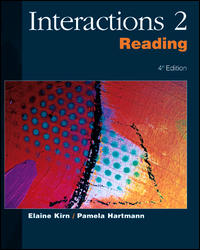 |  Interactions 2 Reading, 4/e Elaine Kirn
Pamela Hartmann
An Online English Class| Teacher: It is prose, and there is a certain level of difficulty to it...Announcer: Dr. Barbara Weskey has a real class and a virtual class, which she teaches from her computer.Teacher: I try to post announcements daily.Announcer: Using a service called Blackboard.com, Weskey has put her twelfth grade Advanced Placement English course online. So students like Lexie Gesualdo attend class at school in the morning, then continue their work after school at home. Online, Lexie gets announcements from her teacher, finds out when assignments are due, links to related Websites for research, constructs her own personal Web page, and talks to her classmates.Lexie: If the period bell rings, and we haven't finished a discussion, we'll post it on the discussion board and continue it there.Teacher: There's a lot of empowerment for the students that this program allows.Announcer: Programs like Blackboard are not only about empowering students, but also their parents, who can check their kids' grades on the Internet. Gone are the days when kids can claim they lost their report card. Also on Blackboard, parents can find out what homework their child has tonight, and they can send e-mails to the teacher.Student 1: In today's busy environment, the ability to log in at anytime, anywhere, and access discussion boards, ask questions of the teacher, I think it's a very powerful way to connect the parent to the school.Announcer: But there are questions about online services such as Blackboard. Will Web monitoring lead to parental micro management? What about students who don't have Internet access? And will teachers take on all the extra work of maintaining a Website?Announcer: Weskey admits it's a lot of work.Teacher: But it's a labor of love. That's the way I look at it.Announcer: What's more, she says this combination of the traditional and the digital has enhanced her class, and looks unmistakably like the future of education. |
|



 2003 McGraw-Hill Higher Education
2003 McGraw-Hill Higher Education

 2003 McGraw-Hill Higher Education
2003 McGraw-Hill Higher Education